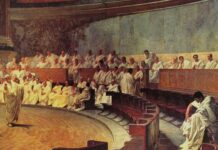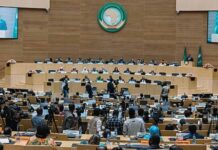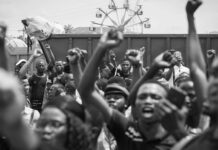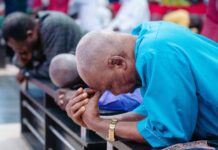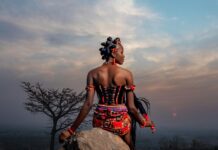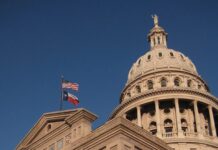Despite the 2027 Nigerian general election being around two years away, we have seen a number of major events taking place over the course of the last few months that have sent shockwaves throughout Nigeria’s political landscape. From the large number of defections aways from the People’s Democratic Party (PDP) to the newly formed coalition of Peter Obi and former Vice President Atiku Abubakar aimed at challenging the incumbent President Bola Tinubu in the 2027 Presidential election.
However, perhaps the biggest shift we are witnessing is the dismantling of the two-party system that has dominated Nigerian politics for the last decade. In the years following the return to democratic rule in Nigeria, after the death of Sani Abacha, Nigeria had effectively been a one party state for over a decade. From the 1999 election – which saw the return to democratic rule – up until the 2015 general election, Nigeria had seen uninterrupted rule by the People’s Democratic Party.
There had been a series of opposition parties that sought to upend the rule of the PDP over the years, however none had been successful in their endeavour. We would see three PDP Presidents elected into power over the course of their 16-year rule of Nigeria. Starting from President Olusegun Obasanjo, who ruled from 1999 to 2007. To President Umaru Yar’Adua, who ruled from 2007, to his death in office in May 2010. Followed by his Vice-President Goodluck Jonathan, who took over following his death.
President Goodluck Jonathan, would likewise extend the political dominance of the People’s Democratic Party by winning the 2011 general election, around one year after he took office following the death of President Umaru Yar’Adua. However, in the 2015 general election, we would see the end of the over-a-decade long political dominance of the PDP officially come to an end. A coalition of opposition parties would join together, forming the All Progressives Congress (APC) to bring an end to the rule of the People’s Democratic Party.
Muhammadu Buhari – Nigeria’s former military head of state – would defeat Goodluck Jonathan in the 2015 presidential election. In his fifth attempt at office, President Buhari would be successful, this time as leader of the newly formed All Progressive’s Congress party. The APC had been a merger of the three largest opposition parties in Nigeria at the time; the Action Congress of Nigeria (ACN), the Congress for Progressive Change (CPC), and the All Nigeria People’s Party (ANPP).
The 2015 election would be significant for a number of reasons. Yes, it was the first time the ruling PDP party would lose a presidential election. However, the 2015 election also marked the first time there had been a peaceful transfer of power within Nigeria’s post-colonial history. It had also been the most expensive election held on the African continent at the time. Moreover, it also saw the beginning of the era of the entrenched two-party system that has dominated Nigeria for the last decade.
In the 2019 Presidential election, the same two parties would compete once again against each other, with incumbent President Muhammadu Buhari facing off against former Vice-President Atiku Abubakar, the newly elected leader of the People’s Democratic Party. In that election, President Buhari would win reelection, winning 19 states and around 55% of the vote.

The likelihood of any kind of third party being able to beat either the PDP or the APC over the last three general elections has been basically nonexistent. Rather than elections being about a battle between political factions to garner support among the Nigerian voters, it has instead become a choice between the lesser of two evils. Both parties in their current forms are extremely unpopular among your average Nigerian. Most have no faith in our electoral process to begin with.
Unlike in other countries, where politics is centred around battles between liberal and conservative political ideologies, there is no such distinction between Nigerian parties. In fact, if you were to quiz your average Nigerian on what the specific policies goals of either the APC or the PDP are, you would likely find that most would not have any clue whatsoever. Nigerian elections instead come down to things like: individual popularity, tribalism, religion and whether a candidate is a Northerner or Southerner.
In practice, there are no real political or philosophical differences between both major parties. One would just have to look at the high number of defections that take place between both parties on a regular basis to come to that conclusion. This year, we have already seen numerous defections by elected governors and members of the National Assembly from the PDP to the APC. One day, you would hear opposition politicians talk of their commitment to fighting back against the government, the next they are being greeted with open arms by members of the ruling party.
Former Vice-president Atiku Abubakar is a glaring example of this very phenomenon. He was President Olusegun Obasanjo’s Vice-president under a People’s Democratic Party government in the early 2000s. Yet, in the build up to the 2015 Presidential election, Atiku would contest to be the presidential candidate of the All Progressives Congress. Then for the 2019 Presidential election, he would once again switch back to the PDP as their presidential candidate.
To make matters worse, the two big parties have leveraged their power to further entrench their positions of power over Nigeria’s political landscape by establishing high barriers for entry that effectively exclude any meaningful participation by ordinary Nigerians. One glaring example is the exorbitantly high fees – often running into tens of millions of Naira – that aspiring candidates must pay just to contest for a seat in the National Assembly under the banner of the two major parties.
A potent example is the recent fees announcement by the APC for aspirants seeking to contest in this year’s by-elections. Candidates that wish to contest under the banner of the APC in the senate would have to pay as much as 20 million Naira, as well as a 10 million Naira fee for candidates for the House of Representatives. These are fees that the average Nigeria, who often earn only a fraction of that total fee, simply would be unable to meet. Similar measures are also used by the People’s Democratic Party as well.
Such high fees basically ensure that only the already established political elites would have the ability to contest with the two major parties in Nigerian elections. And since both parties have been the predominant political factions in Nigeria, that basically ensures that any kind of shake-ups of the status quo is unlikely. Such prohibitive costs not only stifle any kind of real political competition, but they also serve to undermine the very principles of democratic inclusion and representation.
The 2023 Presidential election, however, signalled a potential shift in the entrenched two-party system. As Peter Obi managed to win a substantial proportion of the vote with the Labour Party of Nigeria after he had defected from the PDP. Obi managed to secure 25.40% of the votes, winning in 11 states and the Federal Capital Territory. Notably, Peter Obi would even defeat Bola Tinubu, in Lagos State, Tinubu’s state of origin and a traditional stronghold for him where he previously served as governor.

This performance by a third-party candidate, particularly one who mobilised significant support among younger Nigerian, indicates a challenge to the long-standing dominance of Nigeria’s two major parties. However, despite this strong showing, he would ultimately still place third in the 2023 election, behind the All Progressives Congress and the People’s Democratic Party.
However, this week on the 3rd June, Peter Obi and Atiku Abubakar announced that they have formed an alliance aimed at challenging incumbent President Tinubu in the next Nigerian presidential election. More notably, rather than contesting in the presidential election with the PDP or the Labour Party, both Peter Obi and Atiku have chosen to break away from their respective parties. Both men instead have joined the African Democratic Congress (ADC) party. A lesser-known party, founded in 2005, with a handful of elected members in the House of Representatives.
This coalition may already be considered the favourites to win the 2027 election. If we were to look back at the 2023 Presidential election, the duo combined managed to win around 54.47% of the vote, which would have been more than enough to win in that election. It is, however, notable that we have already seen this coalition before; however, that time it was in the 2019 Presidential election.
When Atiku Abubakar faced off against President Buhari in the 2019 election, Peter Obi ran alongside Atiku Abubakar as his Vice Presidential nominee, and they lost that election. So there is already a precedent set of this coalition falling to win against the ruling APC party. However, one may argue that election may no longer be as relevant, as over the course of the last few years, we have seen Peter Obi gain a lot of support among younger Nigerians which may considerably tip the scale in favour of the Peter Obi and Atiku coalition this time round.
All in all, it is fair to say that this move may be one of the biggest political shake-ups to hit Nigeria since its return to democratic rule in 1999. This coalition has the potential to radically alter the political landscape of Nigeria by bringing an end to the two-party system that has been in place for around a decade now. If they are successful, the increased competition brought about between political parties vying for support among voters will only be a positive thing for Nigeria moving forward.
However, the best way in which we would be able to really bring an end to the two-party system would be by doing away with the first-past-the-post electoral system entirely. The reality is that it is the very nature of the first-past-the-post system that leads to these kinds of two-party systems in the first place. Limiting voters’ options, often forcing them to pick between the lesser of two evils rather than political parties they may genuinely wish to show their support to.
The best way to bring about real change to the Nigerian political landscape would be by implementing electoral reform, putting in place instead an electoral system based on proportional representation. The increased competition for votes between parties would be far greater than the current system, which allows for the kind of entrenched unpopular leadership currently in place. This reform would empower regular Nigerian voters as opposed to the elites which benefit under the current system.
This reform would not only promote fairer representation but also strengthen democratic legitimacy and political stability in the country. The increased competition that may result from Peter Obi and Atiku abandoning the PDP may be a step in the right direction for greater political diversity. However, the best case scenario would be for the total reform of our electoral system in favour of proportional representation.

